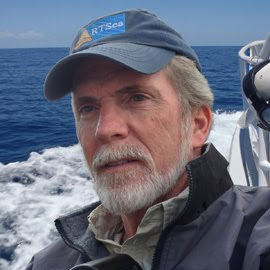The IAP, a group consisting of 105 science academies from around the world, issued a position paper and press release warning of the growing threat from population growth (now on its way to 7 billion) and the damaged caused by the consumption of natural resources to meet the demands of that world populace.
"For too long the dual issues of population
and consumption have been left off the table due to political and ethical
sensitivities. These are issues
that affect us all, developed and developing nations alike, and we must take
responsibility for them together.
Policymakers have an extraordinary opportunity to seize the initiative
at the international summit in Rio and we hope that they will choose to take
the sound, evidence-based advice of their own academies of science as they make
decisions that will affect the future of the planet," said Professors Howard Alper and Mohamed Hassan, co-chairs of IAP.
As an ocean advocate, I press the issue of ocean conservation as the ocean plays a fundamental role in the health of the entire planet. Lose the oceans and we lose it all; game over. But the reality is that what threatens the oceans, all the activities that mankind exercise which puts the environment at risk, all stem from one critical issue, one that we choose to dance around and not address. Nature has it's methods to balance the populations of various species, but humans seem to be in a different category; immune to nature's efforts and content to simply use up earth's limited natural resources - land, water, and air - to sustain itself.
IAP recognizes the delicate nature of the problem. China's approach to population control has been seen as draconian and smacks of some bleak Orwellian future. Some conservationists have suggested that the problem will actually correct itself - unfortunately the solution is through mass famine and starvation mixed with civil upheaval and war. We'll simply begin to kill ourselves off until a sustainable population is reached.
Taking a less dire approach, the IAP has made a series of recommendations to the Rio+20 participants:
- Consideration of population and consumption in all policies, including those related to poverty reduction and economic development, global governance, education, health, gender equality, biodiversity and the environment
- Reduction of levels of damaging types of consumption and the development of more sustainable alternatives, with action critically needed in higher–income countries
- Encouragement of development strategies that help reduce population growth, in particular those that promote education to women and girls
- Provision of access to comprehensive reproductive health and family planning programmes for all. This issue requires substantial additional resources and policy attention from governments and international donors
- A global shift to a new, green economy through the reduction of levels of damaging types of consumption and the development of more sustainable alternatives
- Development of policies that improve the quality of life of older people and create new opportunities for their continued contribution to society
- Development of urban planning policies that take into account future consumption and demographic trends
Source: IAP


















No comments:
Post a Comment